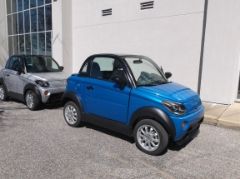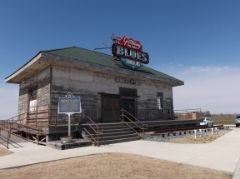 Frankly, the fact that GreenTech didn’t “finish” the application for incentives from Virginia was fallout from the Virginia Economic Development Partnership (VEDP) skepticism. Incentives are not stand alone traps for private sector prey. They are bait in the economic tackle box at the ready when the Commonwealth goes courting.
Frankly, the fact that GreenTech didn’t “finish” the application for incentives from Virginia was fallout from the Virginia Economic Development Partnership (VEDP) skepticism. Incentives are not stand alone traps for private sector prey. They are bait in the economic tackle box at the ready when the Commonwealth goes courting.
Last December, James Bacon trod gingerly when discussing the report by Ryan Nobles implying some kind of chicanery in Terry McAuliffe’s description of the dealings with the Commonwealth. Instead of jumping on the disparaging McAuliffe inference in Nobles’ report ala National Review Online, Bacon analyzed the statements by McAuliffe less literally and the prospects with more balance.
According to a spokeswoman from VEDP, the agency never officially was given the opportunity to bid or not bid on his project.
“We did not receive enough information to respond to GreenTech’s business proposal that was received in 2009,” said Suzane West, the Communications Manager for VEDP. – Ryan Nobles, Richmond’s NBC 12
In the context of the usual opportunities to court industry, this one demanded immediate attention from the VEDP. That is just not the way government operates unless the skids are greased. Well before McAuliffe was a player in GreenTech Automotive, Mississippi was in contention; maybe already had stolen the march. GreenTech extended Virginia a courtesy that was not returned. While Mississippi was paving the highway to Tunica, Virginia built roadblocks. There was no compelling reason or really any way for GreenTech to build a case that could overcome VEDP’s criticisms of its plan. The skepticism and risk analysis were not unwarranted. But Bacon’s own bottom line was appropriate:
“Let’s hope that the business prospects for GreenTech will be sufficiently clear by next year that we can make an informed judgment of McAuliffe’s gubernatorial timber.” – James A. Bacon
If you ask the folks working at GreenTech (not just the front office guys) and the Tunica residents, the prospects are already clear. They believe they are on a winning team. And if you look at the way GreenTech has phased expansion while developing product, you get a measure of a company with leadership and the fiscal discipline to manage the exposure of its investors.
I arrived at the temporary facility in Horn Lake, Mississippi yesterday unannounced with the intent of seeing activity in situ and with no veneer. Yes, I know some friends of Terry, but I did not contact any of them about my journey. This will really disappoint those who took comfort from the Nobles report and saw this all as a McAuliffe pipe dream: right there in plain view were three of the new model prototypes being tested. Bypassing the front office, I went directly to the vehicles and their drivers. These were three proud employees who really enjoyed showing off their product; couldn’t elicit a negative remark from them and they joked with me that they were keeping the most fetching red model out of view. This new version is advanced from the original smaller MyCar model on display in Richmond at the 2010 DPVA convention. It is significantly roomier. It compares favorably in size to the Scion IQ; appears larger than the Smart automobile. They go into production in June, I was informed, with parts fabricated in America.
What seems to be in place is a risk mitigation plan for investors while phasing into full production at the new billion dollar plant in Tunica. The company’s leadership is providing a proof of concept while moving forward rationally. The accounting function is already in Tunica. Makes sense that there is no requirement to force a displacement of a non-production function so they have an advance party already in place that will eliminate any unnecessary personnel turbulence once the factory opens in Tunica. It also provides a connection to the community.
 And the Tunica community is enthusiastic. The local tourism office provided directions to the site where the factory will be built ten miles north of town and to the office “across from the Blue and White Restaurant” in Tunica. Tunica and Mississippi have embraced GreenTech.
And the Tunica community is enthusiastic. The local tourism office provided directions to the site where the factory will be built ten miles north of town and to the office “across from the Blue and White Restaurant” in Tunica. Tunica and Mississippi have embraced GreenTech.
In the end, interpret the 2009 contact with VEDP as a deed done in good faith. As we all know, no good deed goes unpunished. It was too little too late on the parts of both parties. And the context of the Nobles report is the punishment. The more disciplined McAuliffe we are seeing today would have crossed more t’s and dotted more i’s. That might have inoculated the gesture against asides such as today’s:
“McAuliffe plumped for his electric-car company. It led to an unforced error that Republicans could use to reinforce the perception he steers around the facts. In December, McAuliffe said Virginia wasn’t interested in his 1,500-job factory. The record shows otherwise.” – Jeff Shapiro in the Richmond Times Dispatch
Nevertheless, the result would have been the same in the context of 2009. VEDP did not show the kind of interest that would have warranted slowing progress, staying engaged, and poisoning the deal in Mississippi. VEDP’s signals were clear enough that a formal rejection wasn’t necessary. VEDP did not set the hook and GreenTech rejected the bait. If McAuliffe’s interest was only in weaving a story they’d have completed the application.
Like any startup, there is still a long road ahead for GreenTech. But it is much more likely to succeed today than when VEDP first looked at the prospects. Unfortunately, Virginia will wait a while before GreenTech outgrows the Mississippi initiative. But VEDP might want to stay in touch in the interim. Might be that they’ll have an “in” after November.
And I suspect that James Bacon and a whole lot of folks who usually vote Republican are going to find their choice in the booth this November not so easy, particularly with LtGov Bolling’s announcement yesterday.






![Sunday News: “Trump Is Briefed on Options for Striking Iran as Protests Continue”; “Trump and Vance Are Fanning the Flames. Again”; “Shooting death of [Renee Good] matters to all of us”; “Fascism or freedom? The choice is yours”](https://bluevirginia.us/wp-content/uploads/2026/01/montage011126.jpg)











